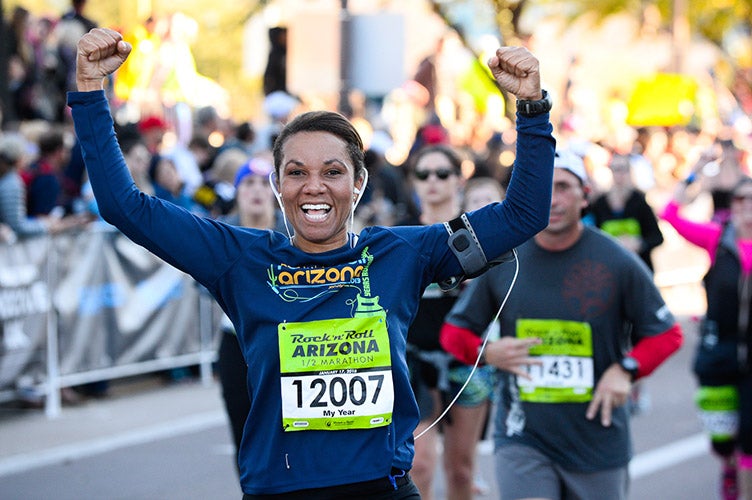A Triathlete's Guide to an Off-Season Half-Marathon PR

Photo: Bruce Wodder
When you’re coming off triathlon season, it feels like a waste of fitness to put your gear in storage and hunker down until spring. That is why triathletes often turn their focus to a fall or winter half-marathon—the perfect distance to keep a training focus without overwhelming your more relaxed post-season schedule. Indeed, countless multisport athletes have discovered that stand-alone running performances benefit from a triathlon base. “Many runners who take up triathlon find that they are able to improve long-standing personal bests as they become more aerobically fit and can tolerate more training,” says coach Mark Pearce of Intelligent Triathlon Training in Loughborough, England.
This doesn’t mean that you should ditch your bike and wetsuit and triple your running mileage. There’s an art to transitioning as you work to maintain fitness while refocusing your efforts on running.
“Your physiology doesn’t know the difference between cycling and running, but your muscles, tendons and neural networks do,” Pearce says. Put simply, by continuing with endurance-based rides, you improve your cardiovascular fitness, which will transfer to running. Since running is a high-impact activity, however, it is important to prepare your body for the pounding with some additional run workouts.
While you may continue with biking mileage, swim workouts are commonly reduced when training for a half-marathon. If you have been working to improve your swim, however, keep swimming 1–2 times per week to ensure that form and efficiency aren’t lost.
Pearce cautions to take suitable rest periods in the program. “Recovery is as important as ever, especially before the race,” he says. By taking a bit of time off before ramping up to half-marathon training, as well as tapering before the race, you dramatically reduce the likelihood of injury and overtraining.
Pearce shares this eight-week approach below.
RELATED: Should You Run A Marathon In The Off-Season
8-Week Training Plan
Weeks 1–2: Depending on the triathlon distance you just raced, it’s important to take a little time off to allow your body and mind to bounce back. If you were focused on the sprint distance, one week is probably enough if you are injury-free. A 70.3 race may require 10 days to two weeks, and up to three weeks may be necessary for a full Ironman. During this time, allow yourself some rest and recovery mixed in with light exercise.
Week 3: Add in a tempo run and start building your long run. For your tempo effort, run 30 minutes around lactate threshold pace or “comfortably hard,” along with a warm-up and cool-down. Whether you were training for a long- or short-course event, you can likely start with a 6–8-mile long run this week. Drop your swim workouts to one per week and maintain bike workouts.
Week 4: Run a 35-minute tempo run and increase your long run by 1–2 miles. Remember your running mileage shouldn’t increase more than about 10 percent from one week to the next.
Week 5: Do a 40-minute tempo run and increase your long run by 1–2 miles. Add in a speed workout in the form of a fartlek run or longer track intervals between 800 and 1200 meters. This may require you to cut out or reduce a bike workout.
Week 6: Run a 45-minute tempo run and increase your long run by 1–2 miles to total 10–12 miles. Include another speed workout and increase the repetitions.
Week 7: Run a 40-minute tempo run and reduce your long run to 6–8 miles. Include a shorter speed session. Cut out the swimming workout.
Week 8 (Race week): Run a 30-minute tempo early in the week and do 1–2 days of 3–5 easy miles and 1–2 days of 45-60 minutes on the bike. Be sure to take 1–2 rest days leading up to the race.